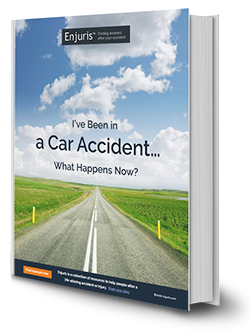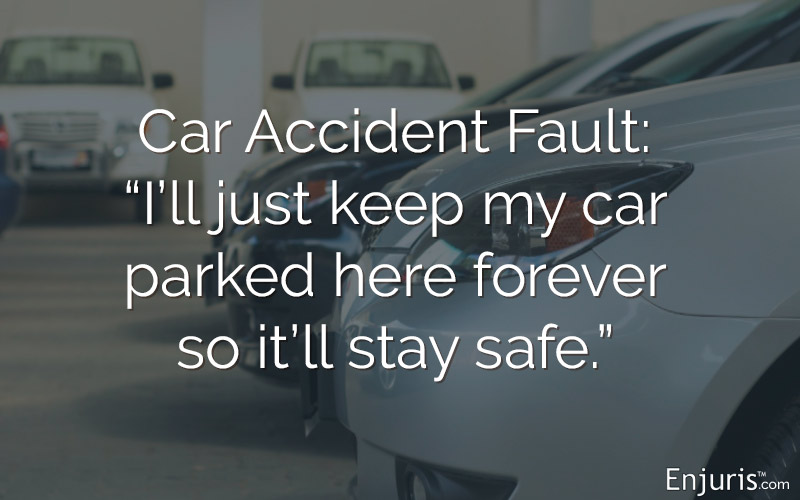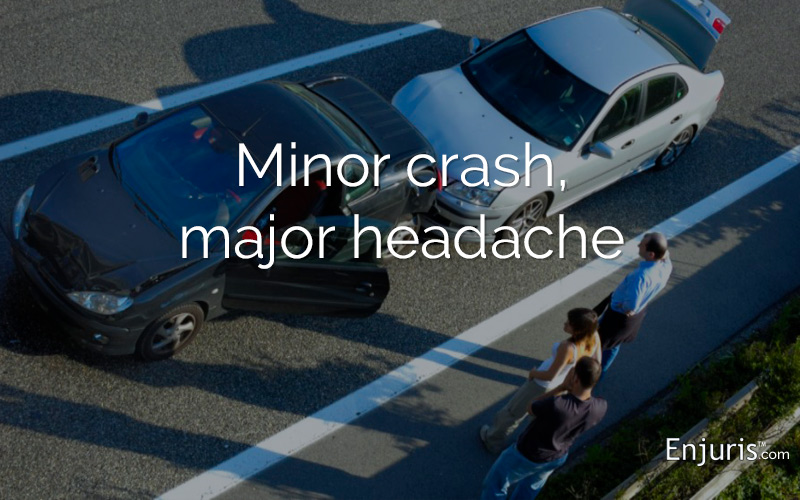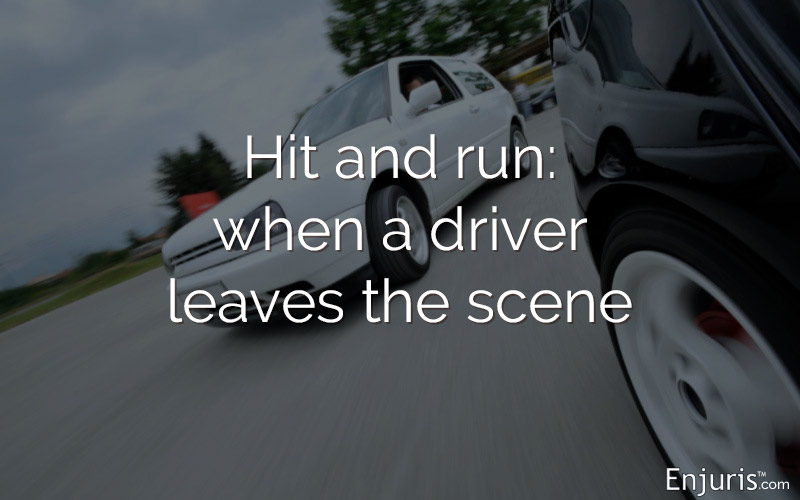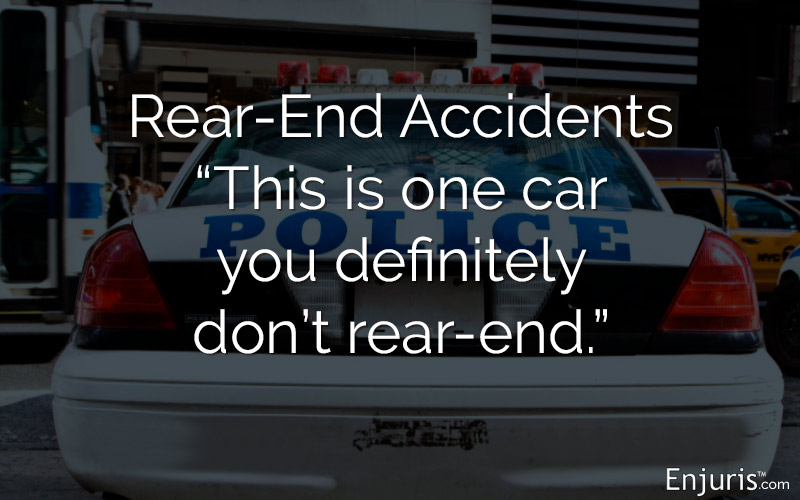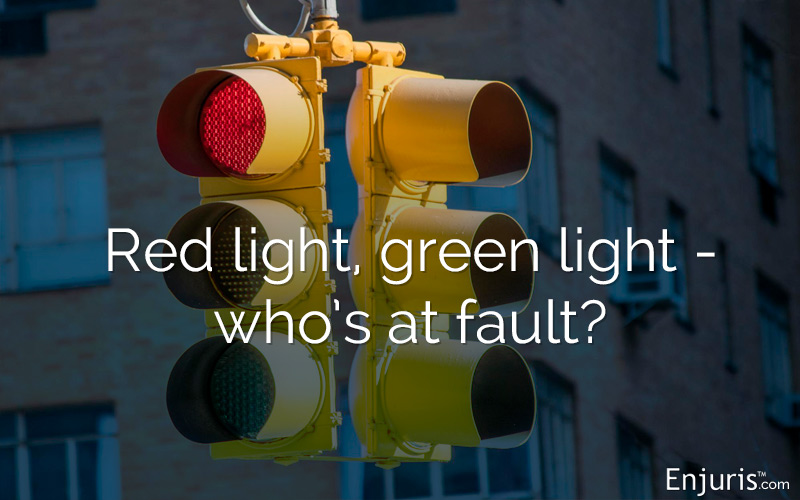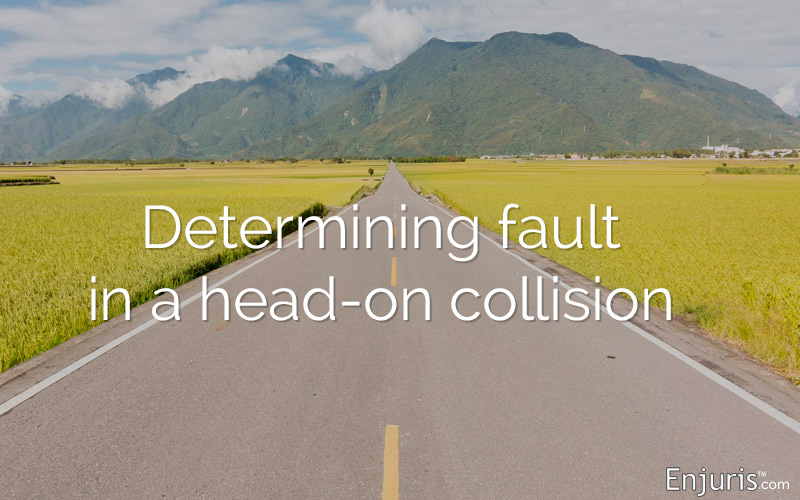What to do if you're the victim of a car accident...or if you caused one
Every state is either an at-fault or a no-fault state for financial liability after a car accident. In a no-fault state, each person's insurance would cover their own costs regardless of who caused the accident.
But Maryland is an at-fault state, which means that determining who caused the accident is very important for providing compensation to either party.
An at-fault state is also known as a "tort" state. That means the financial costs of any accident or injury are covered by the insurance policy belonging to the person who is at fault, or liable, for the crash.
In other words, if you're injured in a car accident in Maryland, there are 3 ways to pursue compensation:
- File a claim against the at-fault driver's insurance company.
- File a personal injury lawsuit against the at-fault driver.
- File an uninsured motorist claim on your own insurance policy if the at-fault driver doesn't have insurance.
How to determine who's at fault for an accident
There are several factors that are included in making a liability determination, and sometimes there's more than 1 driver who's at fault.
It's always a good idea to get a police report after an accident, no matter how small. It's also important to report it to your insurance company.
Remember: a report is different from a claim. In other words, you can report the accident to the insurance company and decide later that you're not going to file a claim. But if you choose not to report the accident to insurance within a certain period of time, then you might lose the ability to make a claim later if settling up with the other driver doesn't work out.
A police officer is trained to assess the accident scene and make observations about weather conditions, street signs and signals, the position of vehicles, types of damage, and other evidence that might contribute to demonstrating how the accident happened.
In addition, the police officer should obtain contact information from witnesses if they are at the scene.
When you file a claim with your insurance company, the adjuster will also ask for your own statement and if there's any other information that would be important.
As they attempt to settle a claim, insurance companies will often conduct their own accident investigations to determine fault. This might include reports by people who are trained to recreate an accident scene and other forensic experts, as well as taking the police reports and witness statements into consideration.
Sometimes, fault is clear and the insurance companies only need to negotiate how much the damages are and not who pays. But when there are questions about which driver is at fault, it's much more complicated.
If that's the situation, you should call a personal injury lawyer to sort things out. A lawyer has access to additional resources and experts, and they'll be your advocate when dealing with the insurance company.
You're under no obligation to speak with the other driver's insurer. They might call you after your insurance company initiates the claim and there are tricks that adjusters use to try to get you to admit fault without realizing it.
Your lawyer can handle these calls from the insurance company in order to make sure to maximize your compensation.
Do I have to get a police report?
You're not required by law to get a police report if the accident is minor and no one was injured. You are required to get a police report if anyone was injured, if any involved driver is uncooperative and refuses to provide their information, or if any driver is drunk or leaves the scene of the accident.
However, it's best to get a police report even if it's not required for your accident. The police report can be an important piece of evidence as you seek compensation.
Liability and negligence in a Maryland car accident lawsuit
There are 2 reasons to file a lawsuit following a car crash:
- If you're in a car accident and it's clear who's liable (at fault), and their insurance covers the extent of your injuries, receiving compensation might not be difficult. However, even if the defendant's insurance company agrees that the defendant is at fault, they still might not provide the full amount you need to cover your expenses. Or, if your injury is very serious, the defendant's insurance policy might not provide enough coverage. If insurance falls short, your next step is to file a personal injury lawsuit.
- Insurance should cover expenses that include medical treatment and lost property. But if your accident is severe and you wish to recover non-economic damages for pain and suffering, emotional distress, or other things not covered by insurance, you'll need to file a lawsuit to recover other types of damages.
If you file a lawsuit, you'll need to prove the following 5 elements:
- Duty. An injured person (plaintiff) must show that the defendant owed them a duty. We all have a duty to someone, and that duty changes based on circumstances. You don't have to know someone or have a relationship with them in order to owe them a duty. Every driver has a duty not to cause harm to any other road user, whether it's other motorists, pedestrians, or bicyclists.
- Breach. The second element to a personal injury claim is proving that the defendant breached their duty. In a car accident situation, this means the driver was negligent through action or inaction. They might have been following road rules and driving cautiously, but still made an error (like misjudging speed, for example) that was negligent.
- Causation. Once the defendant has acted negligently, did that negligence cause the accident? A driver might have rolled through a stop sign, but if you failed to look before proceeding through an intersection, the question will be asked whether you or the other driver caused the accident.
- Injury. In order to have a valid claim, you must have suffered an injury. If you were in a minor accident like a slow-speed rear-ender, you might be annoyed but otherwise unharmed. You can't claim damages unless you suffered an actual injury or property loss.
- Damages. Damages are the money you can recover for your losses. If your car accident injury resulted in financial costs, you can claim those expenses as damages. Some accidents result in both economic and non-economic losses. Economic losses equal the money value of what you paid for medical treatment, lost wages or earning capacity, and other objective expenses. Non-economic losses might include pain and suffering, loss of consortium, and other types of emotional distress. These damages can be more difficult to calculate since they are subjective and based on the severity of each case.
Damages from a Maryland car accident lawsuit
Compensatory damages repay a plaintiff for the losses they've endured as a result of the accident. Within compensatory damages, you can recover economic and non-economic damages.
Economic damages
Economic damages are those that have a specific financial cost. This might include:
- Medical treatment. A personal injury award almost always includes the cost of medical care, both to repay what you've already spent on care and to pay for estimated future treatment. Your lawyer will work with experts like doctors, accountants and actuaries to determine what your future medical needs will entail and what they're likely to cost. Medical treatment costs can include doctor and hospital visits, prescription medication, assistive devices, rehabilitative therapies, and any other costs related to your physical recovery.
- Lost income. You can also claim salary and wages as a loss from an accident. This might include the time you had to take off from work following your injury, a reduction in wages if you had to return to a different job than the one you had before the accident, and loss of earning capacity. Loss of earning capacity is the difference between what you would've earned for the remainder of your lifetime and what you will actually earn because of the accident.
- Property loss. If you're filing a lawsuit because of a car accident, the cost of replacing or repairing your car would be included under property loss. You're entitled to the fair market value of any property lost.
Non-economic damages
Non-economic damages don't have a specific monetary value. This category of damages still aims to compensate you for losses, but they could be intangible losses which means it's harder to assign a specific monetary value. Examples of non-economic damages include:
- Emotional distress. Emotional distress damages compensate a plaintiff for the non-physical effects of an injury. This might include fear, anxiety, sleep disturbances, post-traumatic stress disorder, or other psychological conditions that arise following trauma or serious injury.
- Loss of enjoyment. Life is about more than the necessities. You might be able to eat, sleep, and function, but can you enjoy your time? If you were an athlete disabled in an accident or a pianist who effectively lost the use of your hands, you might be suffering because you've lost a substantial amount of enjoyment in your life. You don't need to be an Olympian or Beethoven to suffer a loss of enjoyment. Anyone who has been injured to the extent that they lose some level of capacity to do the things they previously enjoyed—even if it's walking your dog or playing with your kids—could be eligible for a damage award for loss of enjoyment.
- Loss of consortium. If a loved one was in an accident and lost the ability to provide love, affection, companionship, comfort, or even the ability to participate in household responsibilities and child-rearing, you might have a loss of consortium claim.
Occasionally, you can claim punitive damages for a Maryland car accident, but it's unusual for a court to award them. Punitive damages are awarded to punish the defendant or serve as a deterrent against repeating the behavior that caused the injury. However, it's almost impossible to receive punitive damages for a personal injury because you'd need to prove actual malice and that's unlikely in a car accident.
10 common causes of car accidents
- Distracted driving. Distracted driving is a serious problem. As people become more reliant on cell phones for maps, podcasts, music, traffic reports, and other functions, there is an increasing urge to check their phones. But you should never, ever handle your phone or any electronic device while driving. Driving distractions can also include eating, passenger behavior, personal grooming, or any other behavior that takes your mind, eyes or hands off driving.
- Drunk driving. In Maryland, it's against the law to drive if your blood alcohol content (BAC) is 0.08% or higher. If you're under the influence of alcohol, drugs, or even medications, it can severely affect your driving ability and raises your risk of causing an accident.
- Aggressive driving. You've likely heard of "road rage," which is when a person becomes so angry at another driver that they might bully or even physically harm someone on purpose because they're annoyed at something about their driving. But there are other kinds of aggressive driving that don't necessarily involve anger at a specific individual. Some drivers might be impatient and speed or swerve around cars they think are driving too slowly, make unsafe lane changes, or behave recklessly in some other way that could result in an accident.
- Speeding. Some speeding is aggressive, and some is just careless. You might speed because you're in a hurry or running late, but you shouldn't. Speeding doesn't get you to your destination any faster if you crash. And when you speed, you have less time to react to a traffic situation in front of you and stop if necessary.
- Reckless driving. Similar to aggressive driving, reckless driving is any kind of action behind the wheel that's unsafe. It might be speeding, weaving, dodging other cars, failure to stop at lights or stop signs, or any other number of aggressive driving practices that break road rules or are unsafe.
- Inexperienced drivers. Your teenager might be the most responsible kid around, and they might care a lot about following road rules, driving at the correct speed, heeding stop lights and signs, and doing everything "right." But younger drivers are inexperienced. That lack of experience could cause even the most careful driver to misjudge the speed of an oncoming car, poorly execute a turn, or make other mistakes that result in an accident. And, some teenagers are more likely to take risks than an older driver would.
- Tailgating. Tailgating is when a driver follows too closely behind the driver in front of them. Some tailgating is aggressive, but sometimes it happens because someone isn't paying attention or simply doesn't see the practice as dangerous. When traveling 55 mph, you should leave 16 car lengths (which is about 243 feet) between your vehicle and the car in front of you. Tailgating is dangerous because when you're too close to another vehicle, you don't have enough time to stop if you need to do so quickly.
- Weather conditions. Maryland is no stranger to severe weather — ice, rain, wind, fog and other conditions are a regular part of life. When the weather is extreme and visibility is poor, it's best to stay off the roads when you can. But when that's not practical or realistic, exercise caution and drive slowly.
- Failure to obey traffic laws. Traffic laws are more than just stopping at red lights. Following the speed limit, staying in your lane, passing bicyclists safely, and yielding to pedestrians are just a few of the many important aspects of driving responsibly. Be familiar with the traffic laws in your local area and state, and obey them to reduce your risk of a collision.
- Failure to stop at a red light or stop sign. Although stopping for stop signs and traffic lights are part of following traffic rules, they're also among the ones drivers break most often. Even if you think you're driving through a "quiet" intersection, you must stop completely at stop signs and lights.
Steps to take after a car accident in Maryland
- Stop. If you've been in an accident, Maryland law requires that you stop your car and remain at the scene. If your car is blocking traffic, you may move it just out of the way and then remain with your vehicle.
- Check your condition and others'. It goes without saying that it's important to check on your physical condition after an accident. If you're injured and can't move or leave your vehicle safely or without further injuring yourself, then don't. Wait for assistance to arrive. But if you can move around, check on your passengers and then anyone in other cars.
- Call for help. Even if the accident is minor, you should call the police.
- Gather witness information. Witnesses are important. The police report should include some witness contact information, but it might not get everyone. Often, the police are most concerned with securing the scene, taking care of medical needs, and minimizing traffic disruption. But most well-meaning witnesses and Good Samaritans who might stop to help at an accident will leave once they see that first responders have things under control. That's why, if you're able to catch the witnesses before they leave the scene, try to get their contact information yourself.
- Take accident scene photos. Accident scene photos can be among your best pieces of evidence. They can show exactly how much damage occurred, what the weather was like, the position of street signs and signals, and other factors that might be essential to proving your case.
- Get a medical examination. You might think you weren't injured or that your injuries are so minor that they don't require treatment. Maybe that's true, but you want to be checked by a medical professional, regardless. After an accident, there's the possibility that you have injuries that you don't notice right away. Symptoms might appear days or even weeks later. If you wait to visit a doctor until symptoms appear, it will be difficult to prove that they're related to the accident. It's crucial that you visit a medical provider such as your own physician, an urgent care facility, or a hospital immediately following an accident.
- Notify your insurance company. Even if you don't want to make a claim against your insurance policy, you still should report the collision. There are risks and benefits to paying out-of-pocket for a car accident and avoiding the insurance company. Sometimes you learn that the damage to your car is more than expected, or medical problems could pop up a few days after the collision — and you'll want to use your insurance coverage. But some insurance companies won't cover an accident if it's not reported within a certain amount of time. Remember, a report isn't the same as a claim. Even if you're not planning to make a claim, you can still file a report.
- Consult a personal injury lawyer. You can use our free Maryland lawyer directory to find a car accident attorney near you who is experienced and skilled with handling injuries like yours. Whether you're the plaintiff or defendant, a lawyer's job is to maximize compensation and minimize your loss.
Did you know that car accident law varies by state?
Hurt in a car crash? You may find these resources helpful
Need a lawyer?
What does an injury lawyer do?
A personal injury lawyer helps individuals who have sustained injuries in accidents to recover financial compensation. These funds are often needed to pay for medical treatment, make up for lost wages and provide compensation for injuries suffered. Sometimes a case that seems simple at first may become more complicated. In these cases, consider hiring an experienced personal injury lawyer. Read more
Common car accidents
